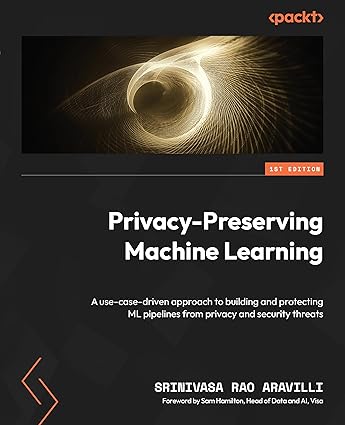 Privacy-Preserving Machine Learning: A use-case-driven approach to building and protecting ML pipelines from privacy and security threats
Privacy-Preserving Machine Learning: A use-case-driven approach to building and protecting ML pipelines from privacy and security threats
by: Srinivasa Rao Aravilli (Author)
Publisher:Packt Publishing
Publication Date: May 24, 2024
Language:English
Print Length:402 pages
ISBN-10:1800564678
ISBN-13:9781800564671
Book Description
Gain hands-on experience in data privacy and privacy-preserving machine learning with open-source ML frameworks, while exploring techniques and algorithms to protect sensitive data from privacy breaches Key FeaturesUnderstand machine learning privacy risks and employ machine learning algorithms to safeguard data against breachesDevelop and deploy privacy-preserving ML pipelines using open-source frameworksGain insights into confidential computing and its role in countering memory-based data attacksPurchase of the print or Kindle book includes a free PDF eBookBook DescriptionPrivacy regulations are evolving each year and compliance with privacy regulations is mandatory for every enterprise. Machine learning engineers are required to not only analyze large amounts of data to gain crucial insights, but also comply with privacy regulations to protect sensitive data. This may seem quite challenging considering the large volume of data involved and lack of in-depth expertise in privacy-preserving machine learning.This book delves into data privacy, machine learning privacy threats, and real-world cases of privacy-preserving machine learning, as well as open-source frameworks for implementation. You’ll be guided through developing anti-money laundering solutions via federated learning and differential privacy. Dedicated sections also address data in-memory attacks and strategies for safeguarding data and ML models. The book concludes by discussing the necessity of confidential computation, privacy-preserving machine learning benchmarks, and cutting-edge research.By the end of this machine learning book, you’ll be well-versed in privacy-preserving machine learning and know how to effectively protect data from threats and attacks in the real world.What you will learnStudy data privacy, threats, and attacks across different machine learning phasesExplore Uber and Apple cases for applying differential privacy and enhancing data securityDiscover IID and non-IID data sets as well as data categoriesUse open-source tools for federated learning (FL) and explore FL algorithms and benchmarksUnderstand secure multiparty computation with PSI for large dataGet up to speed with confidential computation and find out how it helps data in memory attacksWho this book is forThis book is for data scientists, machine learning engineers, and privacy engineers who have working knowledge of mathematics as well as basic knowledge in any one of the ML frameworks (TensorFlow, PyTorch, or scikit-learn).Table of ContentsIntroduction to Data Privacy, Privacy threats and breachesMachine Learning Phases and privacy threats/attacks in each phaseOverview of Privacy Preserving Data Analysis and Introduction to Differential PrivacyDifferential Privacy Algorithms, Pros and ConsDeveloping Applications with Different Privacy using open source frameworksNeed for Federated Learning and implementing Federated Learning using open source frameworksFederated Learning benchmarks, startups and next opportunityHomomorphic Encryption and Secure Multiparty ComputationConfidential computing – what, why and current statePrivacy Preserving in Large Language Models
About the Author
Gain hands-on experience in data privacy and privacy-preserving machine learning with open-source ML frameworks, while exploring techniques and algorithms to protect sensitive data from privacy breaches Key FeaturesUnderstand machine learning privacy risks and employ machine learning algorithms to safeguard data against breachesDevelop and deploy privacy-preserving ML pipelines using open-source frameworksGain insights into confidential computing and its role in countering memory-based data attacksPurchase of the print or Kindle book includes a free PDF eBookBook DescriptionPrivacy regulations are evolving each year and compliance with privacy regulations is mandatory for every enterprise. Machine learning engineers are required to not only analyze large amounts of data to gain crucial insights, but also comply with privacy regulations to protect sensitive data. This may seem quite challenging considering the large volume of data involved and lack of in-depth expertise in privacy-preserving machine learning.This book delves into data privacy, machine learning privacy threats, and real-world cases of privacy-preserving machine learning, as well as open-source frameworks for implementation. You’ll be guided through developing anti-money laundering solutions via federated learning and differential privacy. Dedicated sections also address data in-memory attacks and strategies for safeguarding data and ML models. The book concludes by discussing the necessity of confidential computation, privacy-preserving machine learning benchmarks, and cutting-edge research.By the end of this machine learning book, you’ll be well-versed in privacy-preserving machine learning and know how to effectively protect data from threats and attacks in the real world.What you will learnStudy data privacy, threats, and attacks across different machine learning phasesExplore Uber and Apple cases for applying differential privacy and enhancing data securityDiscover IID and non-IID data sets as well as data categoriesUse open-source tools for federated learning (FL) and explore FL algorithms and benchmarksUnderstand secure multiparty computation with PSI for large dataGet up to speed with confidential computation and find out how it helps data in memory attacksWho this book is forThis book is for data scientists, machine learning engineers, and privacy engineers who have working knowledge of mathematics as well as basic knowledge in any one of the ML frameworks (TensorFlow, PyTorch, or scikit-learn).Table of ContentsIntroduction to Data Privacy, Privacy threats and breachesMachine Learning Phases and privacy threats/attacks in each phaseOverview of Privacy Preserving Data Analysis and Introduction to Differential PrivacyDifferential Privacy Algorithms, Pros and ConsDeveloping Applications with Different Privacy using open source frameworksNeed for Federated Learning and implementing Federated Learning using open source frameworksFederated Learning benchmarks, startups and next opportunityHomomorphic Encryption and Secure Multiparty ComputationConfidential computing – what, why and current statePrivacy Preserving in Large Language Models Read more
未经允许不得转载:电子书百科大全 » Privacy-Preserving Machine Learning: A use-case-driven approach to building and protecting ML pipelines from privacy and security threats

